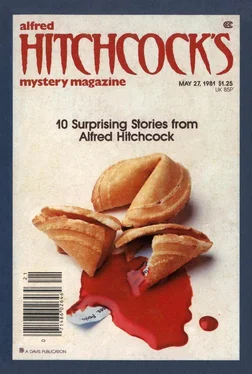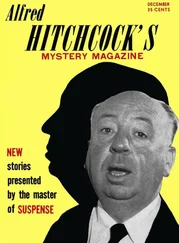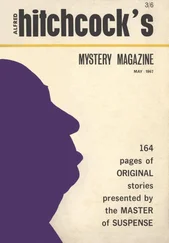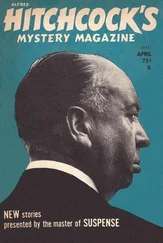Gary Alexander - Alfred Hitchcock’s Mystery Magazine. Vol. 26, No. 6, May 27, 1981
Здесь есть возможность читать онлайн «Gary Alexander - Alfred Hitchcock’s Mystery Magazine. Vol. 26, No. 6, May 27, 1981» весь текст электронной книги совершенно бесплатно (целиком полную версию без сокращений). В некоторых случаях можно слушать аудио, скачать через торрент в формате fb2 и присутствует краткое содержание. Город: New York, Год выпуска: 1981, ISBN: 1981, Издательство: Davis Publications, Жанр: Детектив, Триллер, на английском языке. Описание произведения, (предисловие) а так же отзывы посетителей доступны на портале библиотеки ЛибКат.
- Название:Alfred Hitchcock’s Mystery Magazine. Vol. 26, No. 6, May 27, 1981
- Автор:
- Издательство:Davis Publications
- Жанр:
- Год:1981
- Город:New York
- ISBN:ISSN: 0002-5224
- Рейтинг книги:3 / 5. Голосов: 1
-
Избранное:Добавить в избранное
- Отзывы:
-
Ваша оценка:
- 60
- 1
- 2
- 3
- 4
- 5
Alfred Hitchcock’s Mystery Magazine. Vol. 26, No. 6, May 27, 1981: краткое содержание, описание и аннотация
Предлагаем к чтению аннотацию, описание, краткое содержание или предисловие (зависит от того, что написал сам автор книги «Alfred Hitchcock’s Mystery Magazine. Vol. 26, No. 6, May 27, 1981»). Если вы не нашли необходимую информацию о книге — напишите в комментариях, мы постараемся отыскать её.
Alfred Hitchcock’s Mystery Magazine. Vol. 26, No. 6, May 27, 1981 — читать онлайн бесплатно полную книгу (весь текст) целиком
Ниже представлен текст книги, разбитый по страницам. Система сохранения места последней прочитанной страницы, позволяет с удобством читать онлайн бесплатно книгу «Alfred Hitchcock’s Mystery Magazine. Vol. 26, No. 6, May 27, 1981», без необходимости каждый раз заново искать на чём Вы остановились. Поставьте закладку, и сможете в любой момент перейти на страницу, на которой закончили чтение.
Интервал:
Закладка:
Alfred Hitchcock’s Mystery Magazine. Vol. 26, No. 6, May 27, 1981

May 27, 1981
Dear Reader:
The twists and turns of the tales in this month’s issue may make your head spin. A couple of business partners try to double-cross each other as well as a hit man in David Morrell’s “The Partnership.” Two muggers find a new variation on the old game in “Spinning the Bottle” by Edwin P. Hicks. A young con man as a client in “The Man Who Flim-Flammed Hiwassee County” by William M. Stephens. Robert Edward Eckels describes an elaborate con in “The Swindle,” and an ex-con returns to a home that’s not quite the way he left it in “Picking Up” by Ernest Savage.
A young man who makes a living writing poetry falls victim to a frameup in “A Cleverly Rearranged Murder” by Richard Purtill, and in Donald Olson’s story a man picks up a hitchhiker who tells him how he can make “An Easy Fifty Bucks.”
We only hope that the crookedness of the plots in this issue doesn’t leave you too dizzy to focus on the printed page.
Good reading.
The EditorsMarti Roch
by William Bankier

They waited supper a full hour and when Felicity did not appear, Sonia left the room with a grim expression on her face. Darius kept on carving the wooden head of a new hand puppet. It was going to be a pretty girl, one he could control.
Sonia’s voice rang down the hall. “Her comb and brush are gone. Her eye makeup is gone.”
Darius set the puppet aside and went to stand in the doorway of his younger daughter’s room. He kept out of this room most of the time because the disarray depressed him.
“She’s run off. I think some of her clothes are gone too.”
“How can you tell?” Darius straightened a school book on the desk beside him. A heap of magazines cascaded to the floor. “Maybe she’s staying with one of her friends.”
“Without telling us? She always phones when she’s doing that.”
They discussed ringing Pamela and asking if Felicity had gone there. Darius was against causing the older sister any worry. “They never spend time together,” he argued.
“Felicity never ran away before either.” Sonia was incapable of sitting still and waiting for a situation to sort itself out. She had to take action, and telephoning her daughter would be only the first move.
During the phone call, Darius went back to his carving. In times of stress, he protected himself by concentrating on his work. The breakdown that forced him to leave the advertising agency had been a blessing in disguise. From being an anxious art director he went to a far happier life as impresario of a children’s puppet theater.
There was luck in it, of course. The arts council put up the money to refurbish and reopen the Lyric Theater in Hammersmith. The Lyric, anxious to maximize audiences, established a children’s theater in an annex and began looking for productions. Darius Fenn was able to audition with a clutch of engaging hand puppets. He did all the voices while Sonia helped with the manipulation. The directors were impressed and the Fenns now performed three days a week. When money ran short, Sonia did part-time secretarial work. Sometimes Darius felt he was being treated to heaven on earth.
“Pam hasn’t heard from her in weeks.” Sonia turned her back on the phone. She picked up her glass and her fingernails clicked angrily against the crystal. “She offered to come over if there’s anything she can do.”
Typical of Pam. She was making sensible progress in the ad business, writing copy, making none of the silly mistakes that had turned her father’s career upside down. Not for her the midday drinking, the too-close personal relationships with clients that went sour and jeopardized accounts.
Darius emptied his own glass. “Can I pour you another gin?”
“I’m calling the police.” She went for the phone. There it was — a hassle with no point to it beyond the fact of doing something.
“The police won’t be able to do anything.”
“This is what they get paid for.” She dialed 999, the emergency number.
“Kids go missing in London by the hundreds. Weeks have to go by before the police will take any notice.”
Sonia behaved with quiet self-righteousness while they waited for the police to show up. Her way was being proved right. Darius set the puppet and the knife aside and concentrated on drinking. He would appear right in the end — and that would make things worse.
There were two young officers in tight uniforms, their belts squeaking as they sat down. Offered coffee, they said “Ta” and one of them placed his walkie-talkie inside his helmet on the settee. They were like casual friends on a social call.
Patiently they told Sonia Fenn exactly what her husband had tried to make her understand.
These days, teenaged girls sometimes liked to take off for a while. Most of them tired of the exposure in a week or so and drifted home to the free food, the warm bed, and the laundry service. So the police did nothing until ten days had elapsed unless there was any reason to suspect foul play.
They went away and the Fenns lapsed into one of their arguments about nothing. They were both frightened and the emotion had to go somewhere. The idea of little Felicity out there with bad companions, becoming involved in...
“We can’t just do nothing,” Sonia said later in the dark bedroom as they were becoming sleepy in each other’s arms. The shouting was all done.
“I’ll look for her tomorrow,” Darius said.
“In all London? Where will you look?”
“I know where her friends hang out. I’ll have a talk with them.”
“They’ll tell you nothing.”
At eleven o’clock in the morning, opening time, Darius walked over to The Crooked Billet. The kids did their drinking here. On a fine day, the patch of grass on the other side of the road would be littered with them by half-past twelve. He nursed a pint near the front window, his mind skating dangerously close to the reality of the situation. If he let the barriers down, he could start feeling the way Sonia was feeling, and that would be terrifying. Felicity had a bit of money saved. What if she and a friend had slipped over to the continent? What if they decided to head for Asia? Darius had just read a book about a psychopathic killer in Nepal named Sobhraj. His daughter, literally, might never be seen again.
Darius went to the lavatory. When he came back to the window he saw the boy he was looking for. He was sitting alone on a stump at the edge of the grass, not drinking, smoking. Darius carried two pints across the road. “Hello, Jeremy. You looked thirsty”
“Thanks, mate.” A year ago, visiting Felicity at home, Jeremy had surprised Darius as he left the house by calling him “mate.” There was an easy rapport between the older man and the younger one. Jeremy seemed to be serving his late teens like somebody under sentence in a rough prison. He appeared to be disintegrating physically and the boredom of his life was agonizing. “Cheers.” The pint was lifted by a skinny arm to vanish into an overgrowth of bushy black moustache, beard, and hair. It came back half empty.
“Have you seen Felicity today?”
“This isn’t today, it’s still last night. I haven’t seen anybody.”
“We’re worried about her. She’s disappeared.”
“Have you called her friends?”
“We only know a few first names. I have no phone numbers, and I don’t even know where they live.”
Читать дальшеИнтервал:
Закладка:
Похожие книги на «Alfred Hitchcock’s Mystery Magazine. Vol. 26, No. 6, May 27, 1981»
Представляем Вашему вниманию похожие книги на «Alfred Hitchcock’s Mystery Magazine. Vol. 26, No. 6, May 27, 1981» списком для выбора. Мы отобрали схожую по названию и смыслу литературу в надежде предоставить читателям больше вариантов отыскать новые, интересные, ещё непрочитанные произведения.
Обсуждение, отзывы о книге «Alfred Hitchcock’s Mystery Magazine. Vol. 26, No. 6, May 27, 1981» и просто собственные мнения читателей. Оставьте ваши комментарии, напишите, что Вы думаете о произведении, его смысле или главных героях. Укажите что конкретно понравилось, а что нет, и почему Вы так считаете.












